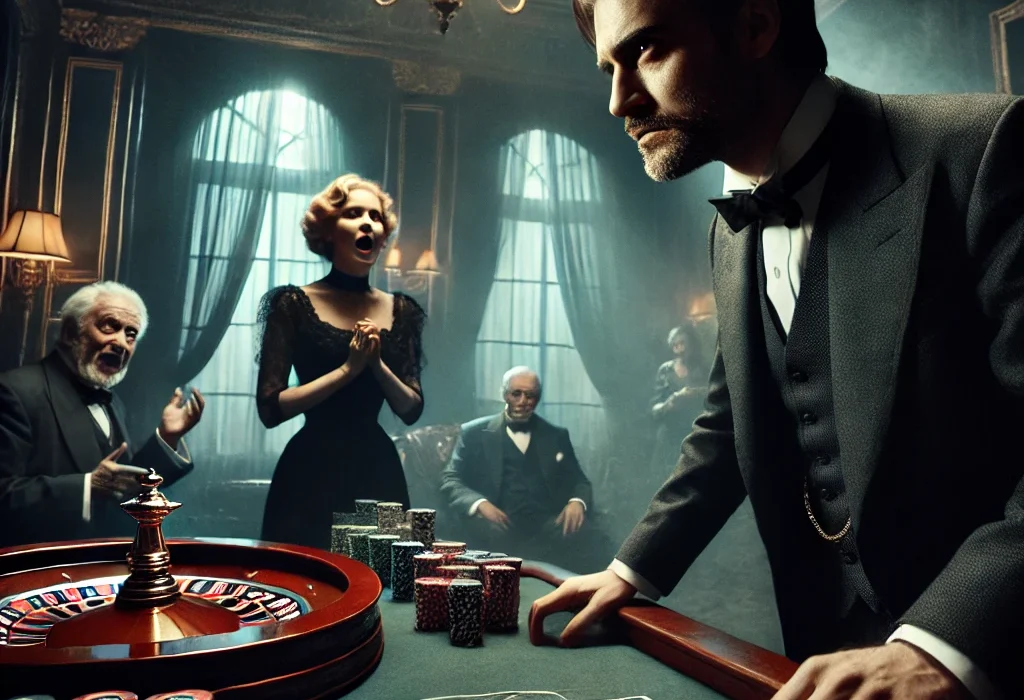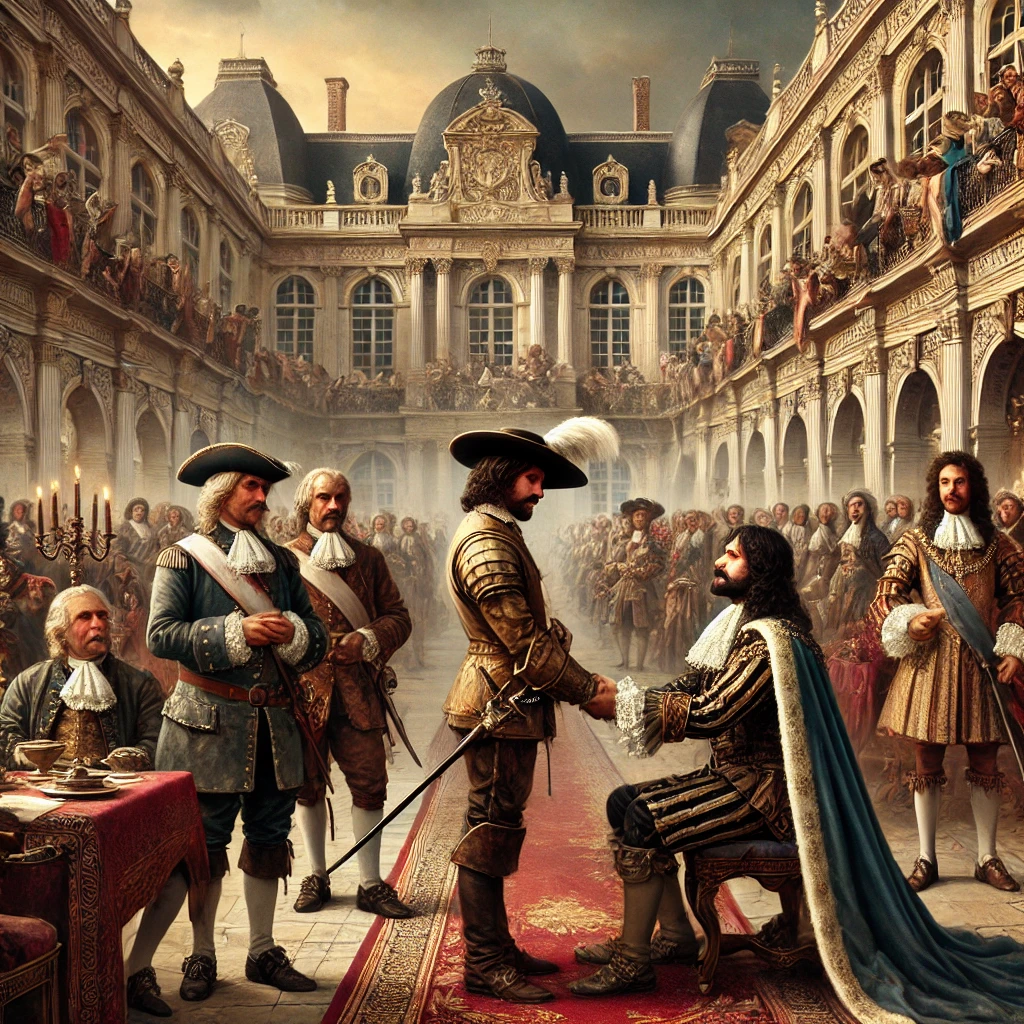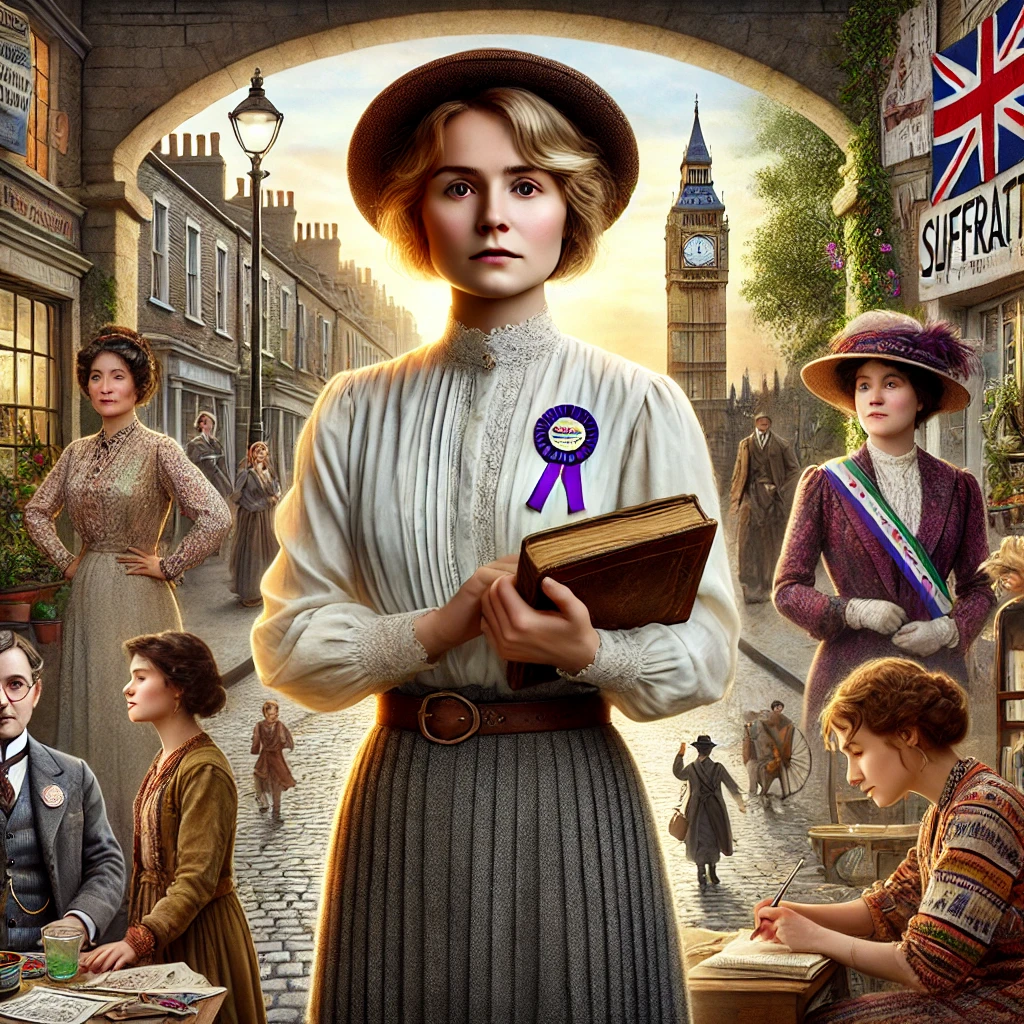The Gambler by Fyodor Dostoevsky, published in 1867, is a psychological exploration of obsession, particularly the destructive lure of gambling. Dostoevsky wrote the novella as a reflection on his own struggles with gambling addiction and financial desperation. The story is set in the fictional town of Roulettenberg and centers around the narrator, Alexei Ivanovich, who works as a tutor for a Russian general’s family. As Alexei navigates the tumultuous relationships within the family, he becomes entangled in both romantic and financial crises, leading him to the roulette table.
Plot Summary
The sun was sinking behind the grand hotels of Roulettenberg when Alexei Ivanovich, a tutor in the service of a fallen Russian general, returned from a short leave of absence. As he stepped into the hotel, he could immediately sense that something had changed. The General, once a proud man, greeted him coldly and dismissed him. Even Polina Alexandrovna, the woman who held Alexei’s heart captive, barely acknowledged his return. Money, it seemed, had appeared from somewhere, temporarily easing the tension that had hovered over the household like a storm cloud. But for how long?
Alexei had been employed by the General for some time, a position that allowed him a small salary but no real place in the family’s intricate social games. The General, beset by debts, was waiting anxiously for the death of his wealthy aunt, the much-discussed “Baboulenka,” whose fortune he desperately needed to restore his standing. Every day, the family lingered on the edge of ruin, sustained by the hope that Baboulenka’s death would provide them the salvation they craved.
As days passed, Alexei became increasingly aware of Polina’s own desperation. Polina was the stepdaughter of the General, and though outwardly cold, she harbored deep complexities. Alexei’s infatuation with her was as irrational as it was intense. Polina, however, treated him with an indifference that bordered on cruelty, yet she kept him close, as if knowing that she could manipulate his devotion whenever she pleased.
One evening, as the family dined with Mlle. Blanche, a glamorous Frenchwoman who had been pursuing the General, Polina confided in Alexei her own urgent need for money. She handed him a sum of money, ordering him to take it to the roulette tables and win for her. For a moment, Alexei hesitated. He had gambled before, but this time it felt different. Playing for himself had always been thrilling, but playing for Polina—for someone else—left him conflicted. Yet, as always, he could not refuse her.
The casino was a whirl of colors, sounds, and anticipation. Alexei’s first few spins of the wheel yielded nothing. The crowd around the table seemed to press in on him, the clatter of chips and the voices around him became a single oppressive hum. But just as he was on the brink of giving up, fortune smiled. Red, black, even numbers—he won again and again until the pile of coins in front of him grew large enough to attract envious glances from the crowd. Clutching his winnings, Alexei returned to Polina, flushed with triumph, only to find her as distant as ever. She accepted the money without a word, leaving him to wonder what new schemes she was plotting.
As Alexei watched Polina from a distance, he became more entangled in the strange dynamics of the household. The General, completely smitten with Mlle. Blanche, was blind to the looming disaster. He believed that once his aunt died, her fortune would allow him to marry Blanche and restore his pride. But day after day, no telegram arrived from St. Petersburg. The family was on edge, and the General’s mounting debts to the Marquis de Grieux, another Frenchman entwined in their affairs, grew more pressing.
One evening, Baboulenka herself arrived in Roulettenberg. To the shock of everyone, the elderly woman, far from being at death’s door, was full of life and fiery spirit. Rather than handing over her fortune, she became a fixture at the casino, gambling with reckless abandon. Each night, she would take a seat at the roulette table, placing large bets with casual disregard for the consequences. The General’s plans crumbled before his eyes as Baboulenka squandered her money on the wheel. His hopes of an inheritance vanished with each turn of the wheel, and his love for Blanche, now based on nothing more than delusion, became a source of ridicule.
Alexei, meanwhile, could not tear himself away from the casino either. At first, his gambling seemed like a means to an end—a way to win Polina’s favor or to assert control over his chaotic life. But as the nights went on, gambling became an obsession. His mind was constantly filled with thoughts of winning, losing, and the fleeting thrill of staking everything on a single spin. Yet, with every victory came an even greater loss. The same reckless abandon that drove Baboulenka had begun to consume him as well.
Mr. Astley, an Englishman who had been a quiet observer of the family’s decline, warned Alexei that gambling would ruin him. Astley had always been a friend to Alexei, though Alexei knew that he was also in love with Polina. Unlike Alexei, Astley’s love was quiet, dignified, and respectful—a stark contrast to Alexei’s feverish passion. Still, Alexei could not heed his friend’s warnings. The pull of the roulette wheel, and the fleeting hope that he could somehow win everything back, was too strong.
As the family’s situation spiraled further out of control, Polina made one last demand of Alexei. She wanted more money—enough to free herself from the debts she owed to the Marquis de Grieux. In one final act of desperation, Alexei returned to the tables. This time, the outcome was different. His luck had run out, and he lost everything. When he returned to Polina empty-handed, she finally opened up to him. Her despair was palpable, and Alexei realized that she had been using him all along. Though she too had been trapped by circumstance, her manipulation of his feelings left him shattered.
In the end, the General’s affair with Mlle. Blanche ended in farce. With no fortune to offer, the Frenchwoman left him, moving on to another wealthy suitor. Baboulenka returned to Russia, her wealth greatly diminished, and the family scattered. Alexei, abandoned by Polina and consumed by his addiction, was left to wander Europe, forever chasing the elusive fortune that roulette had promised but never delivered.
In a final meeting with Mr. Astley, Alexei reflected on his choices. He had gambled away not only his money but also his dignity and his future. Yet, even in the depths of his despair, he could not escape the lure of the wheel. The addiction had taken root, and he knew that he was powerless to resist it.
Main Characters
Alexei Ivanovich: The protagonist and narrator, a young tutor employed by the General. Alexei’s growing obsession with gambling mirrors his deeper emotional turmoil, particularly his unrequited love for Polina. He is intelligent but often acts recklessly, driven by impulse rather than reason.
Polina Alexandrovna: The stepdaughter of the General, Polina is enigmatic and emotionally distant, yet she holds Alexei in her power. Her complex relationship with Alexei plays a central role in the story, as she uses him for her own ends, manipulating his affection for her.
The General: A proud and desperate figure, the General is deeply in debt and is waiting for news of his mother’s death, hoping for an inheritance that will save him from financial ruin. His relationship with Mlle. Blanche further complicates his situation.
Mlle. Blanche: A fortune-hunting Frenchwoman, she pursues the General with the goal of marrying him once he inherits his expected wealth. Her motivations are purely materialistic, and she represents the superficial allure of wealth and status.
Mr. Astley: An Englishman in love with Polina, Astley is a foil to Alexei. He is calm, rational, and morally grounded, in contrast to Alexei’s impulsive and obsessive nature.
Theme
The Destructive Power of Obsession: The novel delves into the compulsive nature of gambling and its capacity to consume lives. Alexei’s addiction to roulette symbolizes the broader human struggle with self-destructive behaviors, driven by hope for quick rewards.
The Pursuit of Wealth: Characters in the story are frequently motivated by the desire for financial gain, whether it’s through inheritance, marriage, or gambling. The novella critiques the hollow nature of wealth and the moral compromises people are willing to make to achieve it.
Love and Power: Alexei’s unrequited love for Polina reflects themes of dominance and submission. Their relationship is a constant power struggle, with Polina holding emotional control over Alexei while he attempts to assert himself through gambling.
Social Status and Identity: The novella portrays characters who are obsessed with their social standing. The General’s preoccupation with appearing wealthy, despite his financial ruin, and Mlle. Blanche’s ambitions to marry into wealth illustrate the superficiality of societal values.
Writing Style and Tone
Dostoevsky’s writing in The Gambler is intense and psychologically probing. The first-person narrative allows readers to experience Alexei’s internal struggles and the feverish highs and lows of his gambling addiction. The tone alternates between dark, introspective, and sardonic, reflecting the disillusionment of the characters as they chase unattainable dreams.
Dostoevsky’s use of dialogue reveals much about the characters’ inner motivations, often displaying their moral ambiguity or outright deceit. His portrayal of the casino environment, teeming with desperation and greed, provides a vivid backdrop that complements the novel’s central themes. The pace of the narrative mirrors the frantic unpredictability of gambling, keeping readers immersed in Alexei’s chaotic mindset.
We hope this summary has sparked your interest and would appreciate you following Celsius 233 on social media:
There’s a treasure trove of other fascinating book summaries waiting for you. Check out our collection of stories that inspire, thrill, and provoke thought, just like this one by checking out the Book Shelf or the Library
Remember, while our summaries capture the essence, they can never replace the full experience of reading the book. If this summary intrigued you, consider diving into the complete story – buy the book and immerse yourself in the author’s original work.
If you want to request a book summary, click here.
When Saurabh is not working/watching football/reading books/traveling, you can reach him via Twitter/X, LinkedIn, or Threads
Restart reading!








